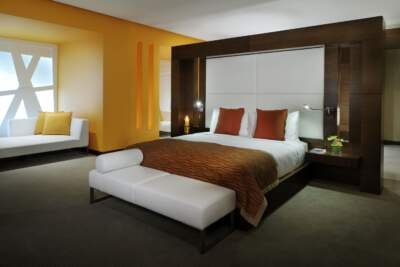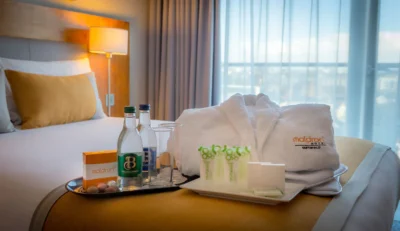Hotel Amenities
Key Considerations for Optimal Hotel Amenities and Furnishings
When embarking on the journey of building a hotel, the choice of furniture and building materials plays a pivotal role in ensuring a successful and sustainable establishment. In this article, Saudi Design Group delves into four crucial aspects to contemplate when procuring hotel furniture, shedding light on considerations that go beyond mere aesthetics.
Ensuring Longevity and Eco-Friendliness
The Lifecycle Challenge: Hotels endure for decades, ranging from 10 to 30 years. The article emphasizes the need for furniture that not only stands the test of time stylistically but also meets the rigorous demands of its lifespan.
Informed Material Selection: Hotel furniture suppliers are urged to delve into the manufacturing processes, understanding how each item is crafted and anticipating the conditions in which the furniture will be used. This knowledge enables the selection of materials, colors, textures, and fabrics that guarantee both longevity and environmental responsibility.
Harmonizing Aesthetics and Sustainability: The article underscores the delicate balance between maintaining the hotel’s aesthetic appeal and achieving sustainability goals. Hotel Amenities
Reflecting Individuality and Enhancing Categorization
Beyond Aesthetics: The style of furniture contributes not only to its visual appeal but also serves as a means to communicate the hotel’s unique identity. The article emphasizes the importance of comprehending the messaging conveyed by different furniture styles.
Customization for Distinct Spaces: In the context of hotel rooms, where space is often at a premium, hotel furniture suppliers are encouraged to create custom pieces tailored to the dimensions of each room. This approach ensures a unique and well-utilized space.
Hotel Accommodation: Crafting Environments that Stand Out

Significance of Environment: The article highlights the pivotal role of the hotel environment, especially in themed hotels. Hotel furniture manufacturers are urged to carefully choose designs that enhance and distinguish their establishments within the competitive landscape.
Theme Integration: Themed hotels, in particular, demand a thoughtful selection of furniture designs that align with and enhance the overall thematic concept.
Positioning: Creating Memorable Guest Experiences Hotel Amenities
Cognitive Stimulation: Guests expect a seamless blend of comfort, adaptability, and enjoyment from the moment they step into a hotel. The article emphasizes the importance of creating spaces that cater to various needs, from lounging and waiting to business activities and tours.
Versatility in Open Spaces: Modern guests demand versatility in open hotel spaces, expecting them to effortlessly transform into lounges, waiting rooms, cocktail bars, business centers, and more.
In the ever-evolving landscape of hotel design, these four key considerations – sustainability, style, hotel accommodation, and positioning – serve as a comprehensive guide for hoteliers and furniture suppliers alike. By prioritizing these aspects, a hotel can not only meet the immediate needs of its guests but also ensure long-term success and a positive environmental impact. Hotel Amenities

Key Considerations for Optimal Hotel Amenities and Furnishings
When embarking on the journey of building a hotel, the choice of furniture and building materials plays a pivotal role in ensuring a successful and sustainable establishment. In this article, Saudi Design Group delves into four crucial aspects to contemplate when procuring hotel furniture, shedding light on considerations that go beyond mere aesthetics.
Ensuring Longevity and Eco-Friendliness BUILD A BETTER TOMORROW
The Lifecycle Challenge: Hotels endure for decades, ranging from 10 to 30 years. The article emphasizes the need for furniture that not only stands the test of time stylistically but also meets the rigorous demands of its lifespan.
Informed Material Selection: Hotel furniture suppliers are urged to delve into the manufacturing processes, understanding how each item is crafted and anticipating the conditions in which the furniture will be used. This knowledge enables the selection of materials, colors, textures, and fabrics that guarantee both longevity and environmental responsibility.
Harmonizing Aesthetics and Sustainability: The article underscores the delicate balance between maintaining the hotel’s aesthetic appeal and achieving sustainability goals.
Reflecting Individuality and Enhancing Categorization
Beyond Aesthetics: The style of furniture contributes not only to its visual appeal but also serves as a means to communicate the hotel’s unique identity. The article emphasizes the importance of comprehending the messaging conveyed by different furniture styles.
Customization for Distinct Spaces: In the context of hotel rooms, where space is often at a premium, hotel furniture suppliers are encouraged to create custom pieces tailored to the dimensions of each room. This approach ensures a unique and well-utilized space.
Hotel Accommodation: Crafting Environments that Stand Out Hotel Amenities
Significance of Environment: The article highlights the pivotal role of the hotel environment, especially in themed hotels. Hotel furniture manufacturers are urged to carefully choose designs that enhance and distinguish their establishments within the competitive landscape.
Theme Integration: Themed hotels, in particular, demand a thoughtful selection of furniture designs that align with and enhance the overall thematic concept.
Technological Integration: In today’s digital age, integrating technology into hotel furniture is becoming increasingly relevant. Smart furniture, equipped with features such as wireless charging stations, smart lighting, and IoT connectivity, can enhance the overall guest experience. BUILD A BETTER TOMORROW

Creating Memorable Guest Experiences Hotel Amenities
Cognitive Stimulation: Guests expect a seamless blend of comfort, adaptability,
and enjoyment from the moment they step into a hotel. The article emphasizes
the importance of creating spaces that cater to various needs, from lounging
and waiting to business activities and tours.
Versatility in Open Spaces: Modern guests demand versatility in open hotel spaces, expecting them to effortlessly transform into lounges, waiting rooms, cocktail bars, business centers, and more.
Sustainable Practices: Beyond furniture, the article suggests adopting sustainable practices in other aspects of hotel management, such as waste reduction, energy efficiency, and water conservation, to align with the growing global focus on eco-friendly hospitality.
In the ever-evolving landscape of hotel design, these four key considerations – sustainability, style, hotel accommodation, and positioning – serve as a comprehensive guide for hoteliers and furniture suppliers alike. By prioritizing these aspects and embracing technological and sustainable trends, a hotel can not only meet the immediate needs of its guests but also ensure long-term success and a positive environmental impact. Hotel Amenities BUILD A BETTER TOMORROW

What sets Saudi Design Group apart?
Guest Room Essentials: Comfortable Furniture Tips

